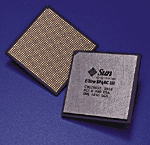Sun: Test Versions Of UltraSPARC V Could Be Ready By Late 2003
David Yen, vice president and general manager of Sun's processor products group, also said the company is enjoying increased customer inquiries, as a result of decisions by Compaq Computer and Hewlett-Packard to exit the chip business and adopt Intel's Itanium line. "The CPU is the soul of the system," he said. "Sun is a system company."

\
Sun plans to continue building on key features of UltraSPARC III processors.
Yen said Sun will continue to build on key features of its UltraSPARC III processors, including improving on-board memory to increase overall system speed.
"It doesn't matter how fast a processor can cycle if it has to wait for the memory," said Susan Kunz, director of marketing and bus development for Sun's processor products group.
Yen did not provide additional details of what features will be rolled out in UltraSPARC V, its next major processor release, and UltraSPARC IV, an interim release expected before UltraSPARC V. However, others outside the company were bullish.
"I've seen the road maps, and they are very impressive," said William Wetmore, director of Sun reseller Vulcan Microsystems, Miami.
"I am very happy as a Sun reseller to be focusing our efforts on Sun's technology."
Key to the technology has been Sun's efforts on binary compatibility, Wetmore said. "That makes our job easier as a reseller," he said.
Yen said early versions of UltraSPARC V will be ready for Sun's fabrication partners in late 2003. After that, partners should factor in time for system quality tests and "make [their best guess" as to eventual ship dates of UltraSPARC V-based systems, he said.
Sun is remaining competitive with Intel in reducing processor power consumption, Yen said. An UltraSPARC III at 1015MHz runs on 75 watts of power, compared with 130 watts for Itanium processors at 800MHz.
While Sun currently uses chips built by Advanced Micro Devices in its low-end Cobalt devices, it has no plans to use AMD's forthcoming, 64-bit Hammer processors in any of its systems, Yen said. The two companies maintain a good working relationship, he said, adding that both consider Intel a top rival.